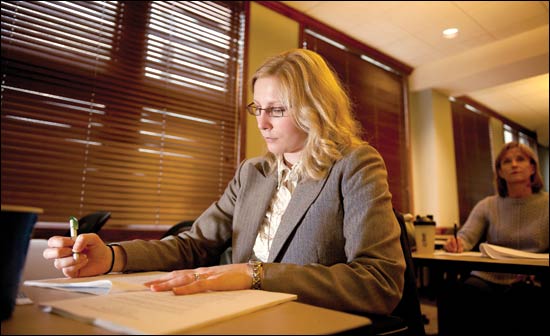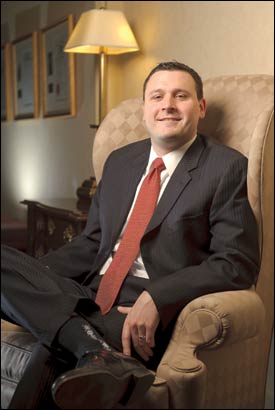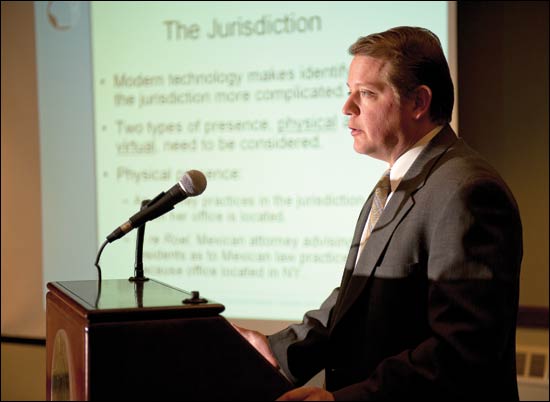Board of Bar Examiners could push mandatory credits outside of the classroom
By: Jack Zemlicka, [email protected]//February 20, 2012//
Board of Bar Examiners could push mandatory credits outside of the classroom
By: Jack Zemlicka, [email protected]//February 20, 2012//


The local newspaper disappeared and the Wall Street Journal took its place between the attorney’s face and the bankruptcy presentation at the front of the room.
Paul Swanson, chairman of the State Bar’s Continuing Legal Education Committee, said all he could do at that CLE session several years ago was stare in disbelief. Here, he said, was an attorney who had paid to attend a presentation to fulfill his CLE credit requirements, and his only focus was on that day’s news.
“All I wanted to do was ask the guy, ‘Why are you here?’” Swanson said. “But it was pretty late in the year, so he probably just needed three credits or something.”
Licensed Wisconsin attorneys must earn 30 CLE credits every two years and report them to the Board of Bar Examiners.
READ A RELATED EDITORIAL: Sleepwalking through CLE
The BBE oversees and evaluates the content of the hundreds of CLE credit-worthy programs, but BBE Chairman Dan Blinka said the board struggles to evaluate what, if anything, participants get out of the sessions.
The board, he said, cannot force attendees to learn something from the sessions. They do not have to take tests to earn the credits, Blinka said, because the board does not have the manpower or the money to devise a system to test and grade every attendee at every CLE session.
Determining the number of test questions, whether they would be multiple choice or essay, and an appropriate passing rate are all practical obstacles, he said, to developing an objective assessment.
“That introduces a level of complexity, difficulty and expense that simply at this moment is not worth imposing on our CLE structure,” Blinka said. “We rely on attorneys’ professionalism and assume good lawyers pay attention to good programs.”
As a result, he said, the BBE only requires attendance — in person, by webcast or by telephone conference — at seminars to earn CLE credits.
“If a lawyer chooses to email or read a book during a CLE session that fails to hold his or her interest,” Blinka said, “there is no violation of the rules because the person is physically present.”
That loose standard can promote wandering minds, said Milwaukee attorney Joseph Newbold of O’Neil, Cannon, Hollman, DeJong & Laing SC, particularly if the program isn’t engaging.
“I’ve never fallen asleep in CLE,” he said, “but I’ve seen others. I think the last CLE I took, there was a guy snoring.”

CLE, in some form, has been in place since the inception of the State Bar in 1878. The state Supreme Court in 1977 implemented the system mandating 30 hours every two years.
On March 2, the BBE will consider tweaking the system. The board is weighing the possibility of opening the credits to pro-bono work to offer an alternative to attorneys who are bored with the classroom, Blinka said.
Seven states — Colorado, Delaware, New York, Minnesota, Tennessee, Washington and Wyoming — offer at least some mandatory CLE credit for pro bono work.
Newbold, who volunteers at the nonprofit Milwaukee Justice Center, said his pro bono work there can be more educational than some CLE seminars. Pro bono time spent on child support, foreclosures or small claims legal questions pushes him beyond his commercial litigation practice, he said.
“With the Justice Center,” Newbold said, “you never know what type of work will come through the door.”
The BBE still would need to set guidelines for pro bono work that qualifies for CLE, Blinka said, but the system likely would need to force attorneys outside of their wheelhouses, he said.
“In terms of value for lawyers,” he said, “handling clients in cases you would never otherwise have likely handled, how is that not enhancing one’s practice and skills as a lawyer?”
Without a requirement that lawyers work outside their normal practice areas, Swanson said, pro bono doesn’t cut it as CLE.
“How is that continuing legal education when you are doing a component of professional service to the public,” he said.
“Read your oath. It’s what you are supposed to do.”
But a for-credit pro bono option would not prevent attorneys from blowing off traditional CLE programs, said BBE Director Jacquelynn Rothstein.
If seminars and a snooze are still on the table, some attorneys will choose those over pro bono.
![]()
- Holocaust survivor calls attacks on diversity, equity and inclusion reminiscent of 1930’s Nazi Germany
- Applied improv workshop helps lawyers learn to think on their feet while earning continuing legal-education credit
- OLR to give 2 seminars on trust-account management
- High court to discuss proposal to expand online CLE requirements
- Board wants to expand CLE possibilities for lawyers
“Is someone who sits in the back of the room and reads the paper going to turn around and do pro bono work?” she said. “There is no guarantee of that.”
Still, Rothstein said, it’s not fair to assume attorneys don’t benefit from traditional CLE offerings just because the BBE can’t track what they’ve learned.
Furthermore, she said, there’s no need to overhaul the system or abolish the mandatory requirement.
“Scrap the entire thing to address what may be a small percentage?” she said. “It’s such an individualized measure.”
The idea to remove “mandatory” from CLE has come up in the past and may again, Blinka said, but the change could hurt new lawyers looking for practical education.
“It may very well be that the inexperienced lawyers, not the seasoned professionals,” he said, “are the ones who benefit most from a mandatory CLE requirement.”
Access to education has changed dramatically in the past three-plus decades, Swanson said, but the requirement still provides a baseline for attorney competency.
“I think it’s really the minimum standard,” he said. “I think that’s the case for any profession that has education requirements and there is an element of public protection there.”
Beyond teaching attorneys, the CLE program feeds the State Bar’s coffers. The bar’s CLE registrations and sales, which include seminars, books, videos and publications, were projected to bring in about $1.77 million as of Dec. 31 for the bar’s 2012 fiscal year.
Ultimately, Blinka said, the success of CLE depends on the attorneys who use it. Those attorneys, he said, deserve trust; not someone looking over their shoulders.
“We’re not going to get administrative search warrants,” Blinka said, “and knock down a door to make sure you went to 50 minutes instead of 48.”
But there is room for improvement, Blinka said, and merit in alternatives such as pro bono. If the BBE decides to endorse the change, the board would have to petition the Wisconsin Supreme Court for a rule change.
The initial concerns and questions shouldn’t be barriers to exploring the option, he said, especially if there’s a chance CLE can trump whatever’s on the front page of the newspaper.
“We want this to be something more,” Blinka said, “than a paper requirement everyone pays nodding attention to.”
[polldaddy poll=”5961531″]
Legal News
- Some State Bar diversity participants walk away from program
- Wisconsin court issues arrest warrant ‘in error’ for Minocqua Brewing owner
- Iranian nationals charged cyber campaign targeting U.S. Companies
- Facing mostly white juries, are Milwaukee County defendants of color truly judged by their peers?
- Milwaukee Mayor speaks in D.C. Tuesday at White House water summit
- Chicago man sentenced to prison after being caught with ‘Trump Gun’
- FTC bans non-competes
- Gov. Evers seeks applicants for Dane County Circuit Court
- Milwaukee man charged in dismemberment death pleads not guilty
- Democratic-led states lead ban on the book ban
- UW Madison Professor: America’s child care crisis is holding back moms without college degrees
- History made in Trump New York trial opening statements
WLJ People
- Power 30 Personal Injury Attorneys – Russell Nicolet
- Power 30 Personal Injury Attorneys – Benjamin Nicolet
- Power 30 Personal Injury Attorneys – Dustin T. Woehl
- Power 30 Personal Injury Attorneys – Katherine Metzger
- Power 30 Personal Injury Attorneys – Joseph Ryan
- Power 30 Personal Injury Attorneys – James M. Ryan
- Power 30 Personal Injury Attorneys – Dana Wachs
- Power 30 Personal Injury Attorneys – Mark L. Thomsen
- Power 30 Personal Injury Attorneys – Matthew Lein
- Power 30 Personal Injury Attorneys – Jeffrey A. Pitman
- Power 30 Personal Injury Attorneys – William Pemberton
- Power 30 Personal Injury Attorneys – Howard S. Sicula











